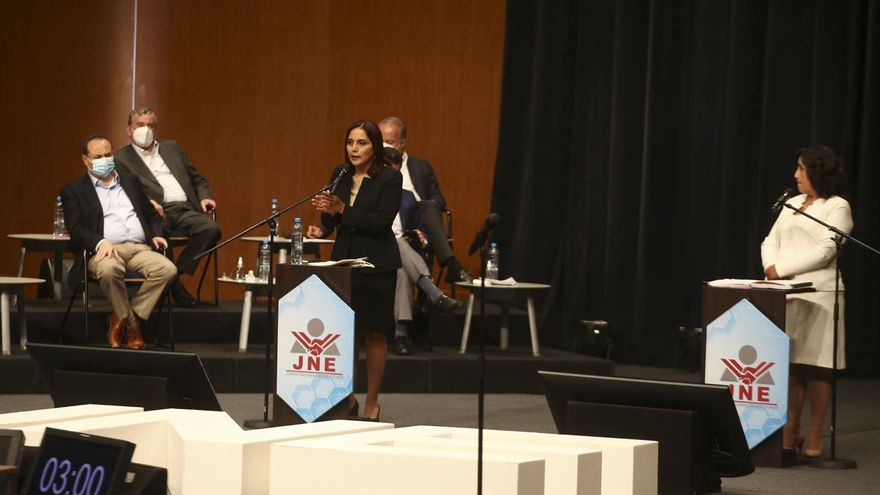RIO DE JANEIRO, BRAZIL – In the final stretch of the highly polarized electoral campaign in Peru, the technical teams of presidential candidates Pedro Castillo and Keiko Fujimori faced each other this Sunday, May 23, in a confrontation full of attacks and ideological clashes, which confirmed their opposing visions on the future of the country.
In this first duel organized by the National Board of Elections (JNE), the representatives of the technical teams of the ultra-leftist Peru Libre party and the authoritarian rightist Popular Force debated six thematic issues: economic recovery, management of the pandemic, decentralization, infrastructure, citizen security and environmental protection.

Two weeks before the ballot that will define the next president of the country, this exchange of ideas reinforced the opposition of both parties on the direction that Peru should take, especially on the continuity of the liberal economic model that has been imposed in the country since the government of former president Alberto Fujimori (1990-2020).
STATISM OR MERCANTILISM
In line with the plan of his party, Peru Libre, to bet on a strengthened State that exercises control over the economy, former congressman Juan Pari insisted on the need for the administration to “promote” job creation programs. Specifically, the leftist party proposes to promote agriculture and create a credit system for small businesses.
The priority, said the member of Castillo’s technical team, should establish an economy open to the international market, which insists on taking advantage of the country’s biodiversity to limit its dependence on the export of raw materials.
Pari stressed that the current economic model had caused 70% of Peru’s economically active population (EAP) to work in the informal sector, “excluded from public policy for years”.
In his intervention in the same block, the representative of Fuerza Popular and former minister Luis Carranza accused the economic plan of Perú Libre of being “a copy of the Venezuelan program” and promised to create close to half a million jobs through a “strong fiscal and financial impulse and a second investment impulse.”
In addition, Carranza added that an eventual Fujimorista government would promote social housing programs, as well as credit for small and medium-sized companies.
NEW OR OLD CONSTITUTION
The other major clash of ideas was manifested in the block on State reform, in which Peru Libre’s first vice-presidential candidate, Dina Boluarte, reiterated her political grouping’s commitment to “lead the people to the elaboration of a new Constitution.”
According to the leftist party, the current Magna Carta, implemented in 1993 after a referendum favored by Alberto Fujimori’s “self-coup”, is responsible for bringing “poverty, inequality and discrimination” to the country.
With repeated attacks on the Fujimori regime of the nineties, Boluarte asserted that the “main task” of a government led by Castillo would be the fight against “the scourge of corruption, no matter who falls”.
For her part, the second vice-presidential candidate of Fuerza Popular, Patricia Juárez, indicated that, unlike Perú Libre, her party is committed to a political reform plan that brings the State closer to the citizens of the country’s regional governments and granting municipalities facilities for investment.
COINCIDENCES IN HEALTH
The greatest points in common were reflected in the block of health and management of the pandemic. Both groups agreed on advancing with the vaccination plan against Covid-19, increasing the number of molecular tests, increasing investment in public health, and reinforcing mental health care.
The member of the technical team of Fuerza Popular José Recoba promised that an eventual fujimorista government would vaccinate 160,000 people daily. All citizens of legal age will receive their doses against Covid-19 before November 30.
He also assured that in the first 100 days of his administration, there would be tracking of infections through molecular tests. The State will be in charge of “providing the necessary oxygen” to those patients who need it.
In his turn, Peru Libre spokesman Hernando Cevallos assured that Castillo’s mandate would allocate a budget of 5 billion soles (US$1.3 billion) to face the pandemic and reinforce the first level of health, which has been “forgotten since Fujimori’s first government”.
Cevallos also insisted on the need to turn health into a “true right” and that “the State takes responsibility” for it.
Next Sunday, May 30, the southern city of Arequipa will be the scene of the second and last electoral debate organized by the JNE. The two presidential candidates will face each other just seven days before the elections on June 6.

